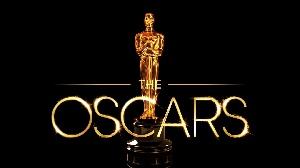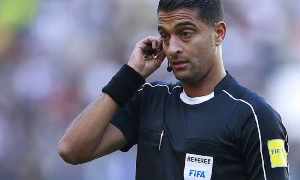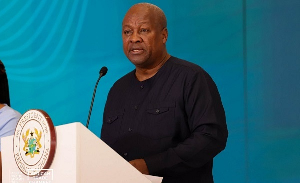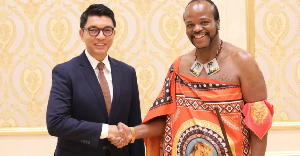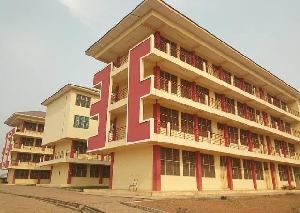Mention the word, “Oscar” and the blood rushes to the head of film-makers. It is the highest accolade in the cinema industry and is usually cornered by the inhabitants of the world’s most famous cinema city – Hollywood.
So when a foreigner wins an Oscar it is big news. When that foreigner happens to be a student, it is even bigger news.
Okay, it is only the student versions of the Oscar that this foreigner won, but hey – it is an “Oscar”, nevertheless. More interesting still for us in Ghana is the fact that the German student won his “Oscar” with a film entitled ‘Galamsey’.
Yes, the word galamsey has not only been absorbed into the English language here in Ghana but has now crossed borders and been catapulted to the very pinnacle of the cinema world – at least, where artistic genius is valued more than commercial pulling power; what is known as “box-office” appeal.
The film, ‘Galamsey’ was shot by film-maker Johannes Preuss in Ghana and looks at the illegal gold trade here. He minces no words in recognising that galamsey could “turn Ghana into a hell.”
Here is an interview conducted by the German TV station, DW [Deutsch Welle] with Preuss:
(INTERVIEW BEGINS)
DW: What is the meaning behind the title “Galamsey“?
Johannes Preuss: The word comes from Ghanaian Pidgin [English] and combines the words for “gather” and “sell”. That’s how people in Ghana refer to this illegal gold mining. It’s an umbrella term for small-scale mining.
– As a student in Germany, how were you made aware of the subject of illegal gold mining in Ghana?
– In 2010, I went to Ghana with the German Development Aid Agency and worked there for a citizen radio channel. That was in the middle of the Galamsey region; the city was located directly on one of Ghana’s major rivers. I was there when the boom was taking place and as a journalist, I found it a really interesting subject. There were so many facets to look at: the catastrophic consequences on the environment, how it has changed people. And when I had the chance to film my first movie while at the film academy [in Germany], I thought it was a good time to focus on the topic.
– One of the people interviewed in your film says, “If we don’t watch out, Ghana will turn into a hell.” What does that hell look like?
Hell looks like a huge crater landscape. Because they cannot dig in rivers, gold mining companies keep digging holes in the earth. They throw water into those holes to extract the gold and keep doing that as long as it’s profitable. But no one covers their holes up when they’re done. That’s why the whole country looks like a lunar landscape. – Gold is – along with cocoa – Ghana’s main export. Who profits from this business?
Multinational corporations retain the main share in the gold industry. Symptomatically, there are no refineries in the country. Gold is refined in Switzerland. Profits go to western countries; hardly anything is left in Ghana. Small businesses only survive as long as they manage to pay [for] the fuel [used by] their excavators. And then there are the illegal gold miners. At the beginning it was the Chinese who brought the necessary technical equipment into Ghana. They were officially thrown out of the country in 2013, but many remained nevertheless. Now the gold business involves a multitude of poor workers from different countries. How does the government deal with Galamsey? – This is currently a huge issue. They have declared war on illegal gold mining. The current government is trying to fight against gold mining on their own initiative.
Can the damage on the environment be repaired? Mercury [ONCE USED] CANNOT BE RETRIEVED FROM THE RIVERS! When gold miners sift and wash river sand, they use mercury that amalgamates with the gold, making it easier to retrieve it from the sand. The mercury that’s then combined with the gold particles is burned and the remaining liquid mercury is [thrown into or] eliminated in [the] rivers. Statistics claim that a third of all mercury found in the Ghana] eco-system is from small-scale gold miners. – Was it difficult for you as a foreign film-maker to gain access to these miners?
– Actually, I wanted to get in touch with the large mining companies, who are the main culprits in the country, but that was impossible. As soon as they’d find out that I had a camera with me, they wouldn’t allow me to enter anywhere. Illegal gold miners were my only remaining option. INTERVEW ENDS
Preuss won in the category of “Best International Documentary”. Preuss, a student at the Baden-Württemberg Film Academy in Ludwigsburg, was the sole nomination in his category. His film ‘Galamsey’ investigates the lives of illegal gold diggers in Ghana. .
“[The film] was definitely not an easy project,” Preuss said. “The Oscar is a huge recognition.”
The Hollywood Academy Student Awards were instituted in 1972 with a goal “to support and encourage excellence in film-making at the collegiate level.”
Meanwhile, a disturbing report issued just ahead of UN World Day Against Child Labour says the exposure of child gold miners in Ghana to life-threatening risks is encouraged by inadequate checks along the supply line.
The report, produced by Human Rights Watch (HRW) says that most mining in Ghana takes place in unlicensed, artisan al or small scale mines, where thousands of children have to carry heavy loads of ore, breath in a lot of dust and a result cough up blood, or develop other respiratory health problems.
The child miners are also exposed to mercury poisoning because they have to process the ore with the toxic substance, risking brain damage and life-long disability. Most of the children are aged between 15 and 17.
Lead HRW researcher Julian Kippenberg told reporters about some of the dangers the children face. “There was a case about two years ago where a boy worked in such mines. He has been working for a while, he is an orphan, living with his aunt. Early one morning, he went to work and basically the walls of the pit caved in and buried him alive,” she said.
Movies of Saturday, 21 October 2017
Source: Cameron Duodu

